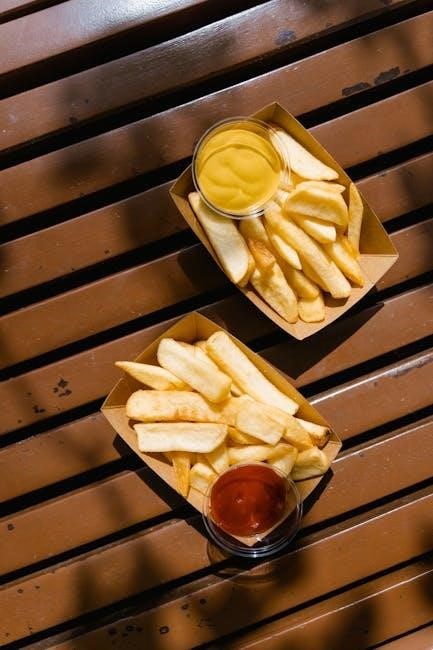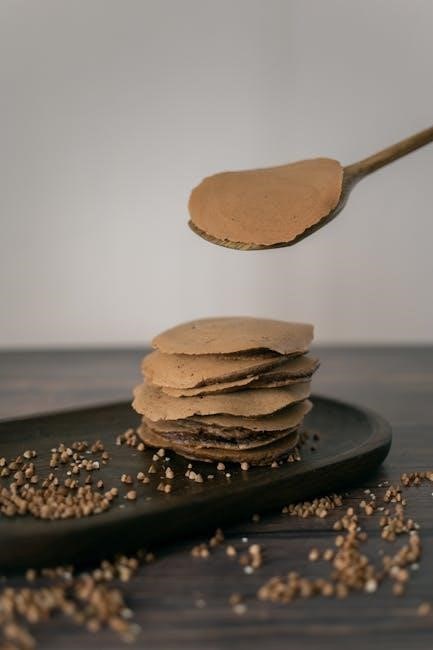A 1000 calorie meal plan is a structured dietary approach designed for weight loss, offering daily meal guidance and customization options to suit individual preferences.
What is a 1000 Calorie Meal Plan?
A 1000 calorie meal plan is a dietary strategy designed to promote weight loss by restricting daily caloric intake to 1000 calories. It typically includes structured meal ideas for breakfast, lunch, dinner, and snacks, ensuring balanced nutrition while staying within the calorie limit. These plans often provide customizable options to suit individual preferences and dietary needs, along with downloadable PDF guides for easy tracking and organization.
Why Choose a 1000 Calorie Diet?
A 1000 calorie diet is ideal for rapid weight loss and kickstarting metabolism. It reduces fat intake, improves overall health, and provides a structured plan for meal preparation. This diet is particularly effective for those seeking significant weight reduction in a short period. Additionally, it serves as a foundational plan that can be customized to suit individual preferences and dietary needs.

Benefits of a 1000 Calorie Meal Plan
A 1000 calorie meal plan aids in significant weight loss, improves metabolism, and reduces fat intake, promoting better overall health and well-being through structured eating habits.
Weight Loss and Improved Metabolism
A 1000 calorie meal plan promotes significant weight loss by creating a calorie deficit, essential for burning fat. It also enhances metabolism, helping the body efficiently process nutrients and burn energy. This structured approach ensures sustainable weight loss while maintaining energy levels, supporting overall health and well-being through balanced and nutrient-rich meals.
Reduced Fat Intake and Health Benefits
A 1000 calorie meal plan emphasizes reduced fat intake, lowering cholesterol and blood pressure. It promotes healthier eating habits, focusing on lean proteins, whole grains, and vegetables. This balanced approach supports weight loss while providing essential nutrients, contributing to overall improved health and well-being through sustainable dietary adjustments.

Sample 1000 Calorie Meal Plan
A typical 1000-calorie meal plan includes breakfast, lunch, dinner, and snacks, balancing proteins, carbs, and fats. Meals like eggs, grilled chicken, and fish are common, ensuring nutritional balance.
Breakdown of Daily Meals
A typical day starts with a low-calorie breakfast, such as scrambled eggs or Greek yogurt, followed by a balanced lunch with lean proteins like chicken or fish. Dinners focus on vegetables and whole grains, while snacks include fruits or nuts. Each meal is portion-controlled to ensure the total stays around 1000 calories, promoting steady weight loss and energy balance.
Nutritional Information and Macros
A 1000-calorie meal plan typically includes 60-80g of protein, 100-150g of carbs, and 20-30g of fat, ensuring balanced macronutrients. Fiber intake is around 20-25g, supporting digestion. Meals are rich in essential vitamins and minerals like vitamin D, calcium, and iron, while keeping sodium and sugar low. This balance helps maintain energy levels and supports overall health during weight loss.
Tips for Success on a 1000 Calorie Diet
Stay hydrated, practice portion control, and incorporate regular exercise to enhance fat loss. Eating smaller, frequent meals helps maintain metabolism and reduces hunger throughout the day.
Hydration and Portion Control
Drinking plenty of water is essential for metabolism and appetite control. Aim for at least 8 glasses daily to stay hydrated and support weight loss. Practice portion control by measuring food quantities to avoid overeating. Balancing meals with lean proteins, healthy fats, and complex carbs ensures satisfaction while maintaining calorie goals. Avoid skipped meals to prevent hunger-driven overindulgence.
Exercise and Meal Frequency
Incorporate physical activity like cardio and strength training to enhance metabolism and support weight loss. Aim for 4-6 balanced meals daily to maintain energy levels and prevent excessive hunger. Pairing exercise with a structured meal plan promotes sustainability and overall health. Consistency is key to achieving and maintaining your weight goals effectively;

Potential Risks and Considerations
A 1000-calorie diet may lead to nutrient deficiencies and fatigue. It’s crucial to ensure balanced nutrition and consult a healthcare professional before starting such a restrictive plan.
Nutrient Deficiencies and Fatigue
A 1000-calorie diet may lead to nutrient deficiencies, particularly in vitamins and minerals like iron, calcium, and B vitamins. This can cause fatigue, weakness, and dizziness. Ensuring balanced meals and considering supplements is essential to mitigate these risks and maintain energy levels while following such a restrictive dietary plan.
Is 1000 Calories Too Low for Some?
A 1000-calorie diet may be too low for individuals with high energy needs, such as athletes or those with active lifestyles. It can also be insufficient for people with certain medical conditions or larger body frames, potentially leading to muscle loss and slowed metabolism. Consulting a healthcare provider is crucial to determine if this calorie intake is appropriate for individual circumstances.

How to Download the 1000 Calorie Meal Plan PDF
Visit reputable health websites like Healthline or Nutrition.gov to download a free 1000-calorie meal plan PDF, offering structured meal ideas and nutritional guidance for weight loss.
Free Resources and Websites
Websites like Healthline, Nutrition.gov, and the Academy of Nutrition and Dietetics offer free downloadable 1000-calorie meal plan PDFs. These resources include shopping lists, recipes, and detailed nutritional breakdowns. They cater to various dietary preferences, such as vegetarian or gluten-free options, ensuring a balanced and sustainable approach to weight loss.
Features of a Good Meal Plan PDF
A high-quality 1000-calorie meal plan PDF should include detailed daily menus, nutritional breakdowns, and recipes. It should cater to dietary preferences, offer flexibility, and provide grocery lists. Clear formatting and printable versions enhance usability, ensuring users can easily follow and track their progress toward weight loss and improved health.
Balancing Your Diet on 1000 Calories
Balancing a 1000-calorie diet involves prioritizing protein, fiber, and essential nutrients to maintain energy and satisfaction, while avoiding deficiencies and ensuring overall nutritional well-being.
Importance of Protein and Fiber
Protein and fiber are crucial in a 1000-calorie diet for maintaining satiety and metabolic health. Protein preserves muscle mass, while fiber aids digestion and prevents cravings. Including sources like lean meats, eggs, whole grains, and vegetables ensures balanced nutrition, supporting sustainable weight loss and overall well-being without excessive hunger or nutritional gaps.
Vitamins and Minerals to Focus On
Essential vitamins like C, D, and B-complex, along with minerals such as calcium, iron, and potassium, are vital in a 1000-calorie diet. These nutrients support immune function, energy production, and bone health. Incorporating fortified foods, leafy greens, and supplements ensures deficiencies are avoided, maintaining optimal health while adhering to calorie restrictions for effective weight loss and overall wellness.
Sustainability of the 1000 Calorie Diet
A 1000-calorie diet can be challenging for long-term maintenance due to calorie restrictions, but with balanced planning, it may support sustained weight loss for some individuals;
Long-term Maintenance and Challenges
Maintaining a 1000-calorie diet long-term can be difficult due to calorie restrictions, which may lead to nutrient deficiencies and fatigue. Many find it challenging to sustain such a low intake, often resulting in relapse. Additionally, social and psychological factors, such as cravings and meal monotony, can hinder adherence. Balancing nutrition while keeping meals varied is crucial for lasting success.
Transitioning to a Less Restrictive Diet
Transitioning from a 1000-calorie diet involves gradually increasing calorie intake to maintain weight loss while avoiding regain. Introduce complex carbs, lean proteins, and healthy fats to diversify meals. This approach reduces feelings of deprivation and promotes sustainable eating habits. Incorporate flexible portion control and balanced nutrition to support long-term health and dietary flexibility.
Alternatives to the 1000 Calorie Plan
Explore higher calorie options like 1200, 1500, or 2000 calories for more flexibility and sustainability, tailored to individual needs and weight loss goals.
Higher Calorie Options (1200, 1500, 2000 Calories)
For those requiring more energy, 1200, 1500, or 2000 calorie meal plans offer balanced nutrition while supporting weight loss. These plans provide greater flexibility, ensuring adequate protein, fiber, and essential nutrients. They are ideal for individuals with higher activity levels or those who find 1000 calories too restrictive. Customizable options cater to diverse dietary needs, promoting sustainable and healthy weight management.
When a Higher Calorie Intake is More Suitable
A higher calorie intake, such as 1200, 1500, or 2000 calories, is often more suitable for individuals with higher energy needs, active lifestyles, or those who require more nutrients. These plans support weight loss while preventing excessive restriction, ensuring balanced nutrition and sustainability. They are ideal for maintaining muscle mass and avoiding fatigue, catering to diverse needs and promoting long-term health.
A 1000-calorie meal plan can be effective for weight loss but may not suit everyone. Balancing nutrition and sustainability is key for long-term success and overall health;
Effectiveness and Considerations
A 1000-calorie meal plan can be highly effective for weight loss, promoting a calorie deficit and improved metabolism. However, it may lead to nutrient deficiencies and fatigue if not properly balanced. Consulting a healthcare professional is crucial to ensure it meets individual nutritional needs and health goals, especially for long-term sustainability and overall well-being.
Encouragement for a Balanced Approach
Embracing a 1000-calorie meal plan requires commitment but offers rewards like weight loss and improved health. Prioritize nutrient-dense foods, stay hydrated, and incorporate physical activity to enhance results. Listen to your body and adjust portions as needed. A balanced approach ensures sustainability and overall well-being, fostering a healthier relationship with food and lifestyle habits;
